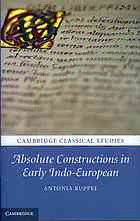Table Of ContentAbsoluteConstructionsinEarlyIndo-European
In the past, discussions about absolute constructions (ACs) have been limited
byanimpreciseunderstandingofwhatACsare.Byexaminingthenatureand
functionofACsandrelatedconstructionsinGreek,LatinandSanskrit,thisnew
study arrives at a clear and simple definition of ACs. Focusing on the earliest
attestedmaterialineachlanguage,ithighlightshowACusagediffersbetween
languagesandoffersexplanationsforthesedifferences.Identifyingthecommon
core shared by all ACs, it suggests a starting point and way by which they
developedintoGreek,LatinandSanskrit.Furtherhistoricalstudyrevealshow
ACs have been conceived of by grammarians, philologists and even Christian
missionariesoverthelasttwothousandyearsandhowenduringmisconceptions
still affect our discussion of them today. All Sanskrit material is annotated in
detail, making it accessible for classicists in particular and allowing a better
understandingofACsinGreekandLatin.
antonia ruppel is the Townsend Senior Lecturer in the Greek, Latin and
SanskritLanguagesatCornellUniversity.
Downloaded from Cambridge Books Online by IP 142.150.190.39 on Thu Jul 18 13:41:09 WEST 2013.
http://ebooks.cambridge.org/ebook.jsf?bid=CBO9781139019736
Cambridge Books Online © Cambridge University Press, 2013
cambridge classical studies
Generaleditors
r. l. hunter,r. g. osborne,m. millett,
d. n. sedley,g. c. horrocks, s. p. oakley,
w. m. beard
Downloaded from Cambridge Books Online by IP 142.150.190.39 on Thu Jul 18 13:41:09 WEST 2013.
http://ebooks.cambridge.org/ebook.jsf?bid=CBO9781139019736
Cambridge Books Online © Cambridge University Press, 2013
ABSOLUTE CONSTRUCTIONS IN EARLY
INDO-EUROPEAN
ANTONIA RUPPEL
Downloaded from Cambridge Books Online by IP 142.150.190.39 on Thu Jul 18 13:41:09 WEST 2013.
http://ebooks.cambridge.org/ebook.jsf?bid=CBO9781139019736
Cambridge Books Online © Cambridge University Press, 2013
cambridge university press
Cambridge,NewYork,Melbourne,Madrid,CapeTown,
Singapore,Sa˜oPaulo,Delhi,MexicoCity
CambridgeUniversityPress
TheEdinburghBuilding,Cambridgecb28ru,UK
PublishedintheUnitedStatesofAmericabyCambridgeUniversityPress,NewYork
www.cambridge.org
Informationonthistitle:www.cambridge.org/9780521767620
(cid:2)c FacultyofClassics,UniversityofCambridge2013
Thispublicationisincopyright.Subjecttostatutoryexception
andtotheprovisionsofrelevantcollectivelicensingagreements,
noreproductionofanypartmaytakeplacewithoutthewritten
permissionofCambridgeUniversityPress.
Firstpublished2013
PrintedandBoundinGreatBritainbytheMPGBooksGroup
AcataloguerecordforthispublicationisavailablefromtheBritishLibrary
LibraryofCongressCataloguinginPublicationdata
Ruppel,Antonia.
AbsoluteconstructionsinearlyIndo-European/AntoniaRuppel.
pages; cm.–(Cambridgeclassicalstudies)
isbn978-0-521-76762-0(hardback)
1.Indo-Europeanlanguages–Absoluteconstructions.
2.Grammar,Comparativeandgeneral–Absoluteconstructions.
I.Title. II.Series:Cambridgeclassicalstudies.
p671.r86 2013
415–dc23 2012019059
isbn978-0-521-76762-0Hardback
CambridgeUniversityPresshasnoresponsibilityforthepersistenceor
accuracyofURLsforexternalorthird-partyinternetwebsitesreferredto
inthispublication,anddoesnotguaranteethatanycontentonsuch
websitesis,orwillremain,accurateorappropriate.
Downloaded from Cambridge Books Online by IP 142.150.190.39 on Thu Jul 18 13:41:09 WEST 2013.
http://ebooks.cambridge.org/ebook.jsf?bid=CBO9781139019736
Cambridge Books Online © Cambridge University Press, 2013
CONTENTS
Acknowledgements pageviii
Listofabbreviations x
Noteontranslations xiv
1 TheACsofar 1
1.1 Whydoweneedanotherstudyofabsoluteconstructions? 1
1.2 PriorresearchonACs 4
1.2.a Thehistoryoftheterm‘absolute’ 4
1.2.b ThedefinitionofACs 7
1.2.b.i Nodefinition 7
1.2.b.ii Descriptioninsteadofdefinition 8
1.2.b.iii Sentenceappositions 11
1.2.b.iv Unusualcaseusage 12
1.2.b.v Dominantparticiples 13
1.2.b.vi Summary 14
1.2.c HowdidACsarise? 15
1.2.c.i Noviewexpressed 16
1.2.c.ii Grammaticalvs.semanticcaseusage 17
1.2.c.iii OVtoVO:Lehmann’sexplanation 22
1.2.c.iv Transformation 23
1.2.c.v Apromisingapproach 25
1.2.d LinksbetweenACsandotherconstructions 27
1.2.e Summary 28
1.3 Thescopeofthisstudy 28
1.4 Summaryoffindings 30
2 EarlyGreek 33
2.1 Introduction 33
2.2 TheGenitiveAbsoluteinHomer:anoverview 36
2.2.a General 36
2.2.b Ambiguities 38
2.2.c Thenatureoftheabsoluteparticiple 41
2.2.d Semantics 42
2.3 Homericquestions 44
2.3.a ‘Lateness’:apreamble 45
v
Downloaded from Cambridge Books Online by IP 94.189.180.110 on Thu Jul 18 13:37:10 WEST 2013.
http://ebooks.cambridge.org/ebook.jsf?bid=CBO9781139019736
Cambridge Books Online © Cambridge University Press, 2013
contents
2.3.b Furthercomponents:signsofdevelopment? 46
2.3.c Transitivity 50
2.3.d Genitiveparticiplesinsteadofanexpected
conjunctparticiple 57
2.3.e Summary 64
2.4 Futureresearch?TheHomericGAincomparisonwithother
meansofgrammaticalsubordination 65
2.5 TheGAinHesiod 68
2.6 TheGAintheseventhandsixthcenturiesbc 73
2.7 Absoluteparticiplesandrelatedphenomena 76
2.8 Conclusions 79
3 EarlyLatin 82
3.1 Introduction 82
3.2 TheLatinAblativeAbsolute:anoverview 83
3.2.a Theformalmake-upoftheAA 83
3.2.b TheAAinEarlyLatin:formalmake-upand
semantictypes 86
3.2.c ClassicalLatin 88
3.3 DelineatingtheAAsemantically:absoluteandotherablatives 89
3.4 DelineatingtheAAsyntactically:obligatoryanddominant
nominalqualifiersacrossLatin 97
3.4.a Theaburbeconditaconstruction(AUC) 97
3.4.b Thegerundive 102
3.4.c Summary 108
3.5 ‘Nominal’ACsinLatin 108
3.5.a AdjectivalAAs 109
3.5.b Comparativematters 115
3.5.c SubstantivalAAs 117
3.5.d *sens 121
3.6 ACsinItalic 122
3.7 Conclusions 123
4 TheSanskritlocativeabsoluteanditssyntactic
surroundings 127
4.1 Introduction 127
4.2 Sanskritliterature:abriefsketch 128
4.3 SomeelementsofSanskritgrammar 130
4.3.a Nominalexpressionsandcasesyntax 130
4.3.b TheSanskritlocativeabsolute 137
4.4 SupposedlyabsolutelocativesintheRigveda 139
4.4.a Time 139
4.4.b Time,spaceandprobablyboth 143
vi
Downloaded from Cambridge Books Online by IP 94.189.180.110 on Thu Jul 18 13:37:10 WEST 2013.
http://ebooks.cambridge.org/ebook.jsf?bid=CBO9781139019736
Cambridge Books Online © Cambridge University Press, 2013
contents
4.4.c Space 145
4.4.d Excursus:aparticularlytrickycase 148
4.5 ActualRigvedicLAs:expressionsofnaturaltime 153
4.6 LAsincontext 156
4.7 TheSanskritperspective 159
4.8 TheoriginsoftheWesternperspective 165
4.9 Conclusions 168
5 Proto-Indo-EuropeanrootsofACs 172
5.1 Introduction 172
5.2 Recapitulation:whatmakesACsabsolute? 173
5.2.a Whatdoesnotmakethemabsolute 173
5.2.b Whatdoesmakethemabsolute:theobligatoryqualifier 176
5.3 Obligatoryandapparentlyobligatoryqualifiers:a
cross-linguisticlook 176
5.3.a TheAUC 177
5.3.b Variouscaseusages 185
5.3.c Conclusions 190
5.4 TheelementsoftheAC 192
5.4.a Participles 192
5.4.b Case 200
5.5 Proto-Indo-European 206
5.5.a ACsinPIE 207
5.5.b AUCsand‘nominal’ACs 214
5.6 FromPIEintothedaughterlanguages 216
5.6.a Sanskrit 216
5.6.b Latin 217
5.6.c Greek 219
5.7 Absoluteornot:anexcursus 222
5.8 Conclusions 224
Appendix1 LiteratureonACs 230
Appendix2 ACs,potentialACsandconstructionssimilar
toACs 233
Bibliography 236
Indexofcitedpassages 251
Generalindex 254
vii
Downloaded from Cambridge Books Online by IP 94.189.180.110 on Thu Jul 18 13:37:10 WEST 2013.
http://ebooks.cambridge.org/ebook.jsf?bid=CBO9781139019736
Cambridge Books Online © Cambridge University Press, 2013
ACKNOWLEDGEMENTS
Theexistenceofthisbook,whichisbasedonthethesisforwhich
I was awarded a PhD by the University of Cambridge in 2008,
wasmadepossiblebythecopioussupportIreceivedfromfriends,
teachers,colleaguesandfundingbodies.
For my PhD, I received a fees-only grant from what was then
theAHRB;ascholarshipfromtheGatesCambridgeTrustkeptme
comfortably fed, clothed and housed. I am especially grateful to
the Studienstiftung des deutschen Volkes, which kept me in their
ideelle Fo¨rderung. Throughout my graduate studies, Newnham
College provided a physical and intellectual home, the basis of
numerous friendships, and gardens to lose myself in whenever
the uncertainties of a multi-year project that might never lead
to anything were becoming too much. (The cats roaming those
gardens also provided great emotional support; I hope they are
stillwell.)
SincerethanksgotoTorstenMeißner,notjustforbeingatruly
inspiring teacher, but also for saying two things that have greatly
influencedmyacademiccareer:‘Sanskritisalwaysuseful’(1998;
had I not started learning Sanskrit when I did, I would not have
been able to take up my current job teaching, among other lan-
guages, Sanskrit) and ‘Then why don’t you write your PhD on
absolute constructions?’ (2001, the effects of which need no fur-
ther explanation). I am enormously indebted to James Clackson,
the Supervisor Better Than Which None Can Be Imagined, who
saw my thesis through to its completion even after I had moved
to the US. Draft chapters e-mailed to Cambridge in the evening
wereoftenreturnedwithdetailedcommentsbythefollowingday;
his suggested timeline for completion, which ends with the line
‘August–havecompletedthesis,openchampagne’stillhangson
the wall above my desk. Geoffrey Horrocks oversaw the early
stages of my thesis work, was always available for questions and
viii
Downloaded from Cambridge Books Online by IP 130.60.206.43 on Thu Jul 18 12:43:51 WEST 2013.
http://ebooks.cambridge.org/ebook.jsf?bid=CBO9781139019736
Cambridge Books Online © Cambridge University Press, 2013

